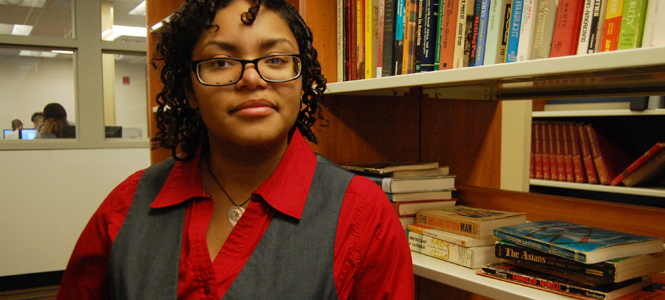Triple-majoring: Two students share their experiences
February 23, 2012
Many Kent State students come to the university with one or even two majors, but a rare number of students decide to take three majors.
Freshman Paisley Stovall spends time playing her saxophone, participating in extra-curricular activities and studying for class, like any other student.
Unlike other freshman, Stovall said she came to Kent State with 108 credits and is now triple majoring in anthropology, pan-African studies and instrumental music with a minor in Japanese.
“Really the reason why I picked all three majors was because it’s hard for me because I have so many, like a wide range of interest, and it’s hard for me to just choose one that I really like,” Stovall said.
Being in non-honors classes, Stovall said she took post-secondary classes in high school because she wanted a challenge.
“I thought this would be a better option for me because I would get college credits out of the way and not have to spend tuition and money to do all that while getting high school credits at the same time,” she said.
Stovall said she has taken 26 credit hours these past two semesters.
“I start all my days 8:50 (in the morning) and most of them end, like classes, at 8 p.m.,” Stovall said. “So it’s really like a 12-hour workday, with the exception of Fridays and Wednesdays, which I try to take off, or I try to keep a few classes on those days.”
Wendy Wilson-Fall, Stovall’s pan-African studies advisor, said in an email if advisors see students become overwhelmed with their three majors, they have the responsibility to reach out to them.
“The most important thing is to help them stay on track, their choice of courses becomes even more important because they literally have no extra time; no time to waste,” Wilson-Fall said.
Stovall said she still thinks she will graduate on time.
“I should graduate 2015 with the other freshman in my class actually,” Stovall said. “But it might actually come earlier depending on how many credits I can take a semester.”
After college, Stovall said she will apply to graduate school at Arizona State University either for anthropology or political science in order to study Native Americans.
“I think to study Native Americans, sometimes, at least I would need to be a part of the political side as well,” Stovall said. “I think all of my majors can fit into my studying of Native Americans.”
Freshman Emily Englehart also triple majors in physics, psychology and criminology with a concentration in criminology and deviance.
Englehart took post-secondary in high school and said she chose two of her majors because of some of the classes she took.
“I took 7 Ideas (That Shook the Universe), and I took psychology, and I really loved those classes,” Englehart said. “At the same time, I was taking high school physics. So I was like, all right, well I like physics so I’ll be a physics major, and I really love psychology so I’ll be a psychology major. And then I was like, well okay this works. And then I took Intro to Justice Studies, and then I decided I was like, all right, let’s add this one on too.”
Englehart said she came to Kent State with 64 credits and started her first year as a junior.
“I got all my Kent Core done, so it wasn’t like, when I got here, it wasn’t, ‘Oh, I have to take this class,’’’ Englehart said. “It was ‘Oh, I’m actually taking classes that directly go towards my major,’ which was absolutely lovely.”
Englehart said after she graduates, she wants to go to law school to become a patent attorney.
“Well, I have to have an engineering or physics background so that kind of just coincides,” Englehart said. “And then criminology and psychology – if I don’t succeed in patent law and I just end up in regular law school, then I’ll have those skills behind me and that knowledge which I can use to hopefully set my defendants free.”
Englehart said students should look into majors before they jump right into the programs and meet with advisors because they will tell you what you need.
“When I was adding my criminology major, I originally started as a minor,” Englehart said. “And I found out by talking through my advisor that I can overlap some of those classes with psychology. So finding little connections like that really help.”
Mark Colvin, Englehart’s criminology advisor, said in an email students with three majors should plan — no later than their sophomore year — with their advisors all the specific and possible courses they will need to take early in their careers.
“If someone does do a triple major, I try to find courses in one of his or hers other majors that might be allowed to substitute for a course or two in the major that I advise for,” Colvin said in the email.
“That way the student can complete requirements in the major for which I advise without necessarily having to go over (or much over) the total credit hours for the degree.”
Contact Alicia Balog at [email protected].












